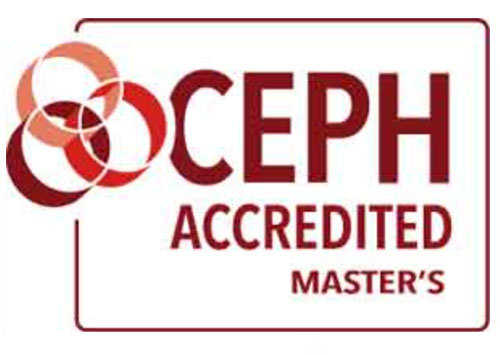The Master of Public Health (MPH) General program provides students with a comprehensive understanding of public health principles, preparing them to address complex health challenges in diverse populations. The program requires a minimum of 48 credit hours, encompassing core courses and concentration courses that cover essential topics such as epidemiology, biostatistics, public health policy, environmental health and health education.
The program’s structure includes a blend of core coursework and specialized concentration courses, allowing students to focus on areas aligned with their career goals. Core courses establish a foundation in public health, while concentration courses enable students to deepen their expertise in specific areas, such as social determinants of health, advanced epidemiology, or public health policy.
To complete the MPH-General program, students must pass a comprehensive examination, which serves as the program’s closure requirement. This exam, based on a case study, tests students’ ability to integrate and apply the knowledge and skills acquired throughout the curriculum. Successful completion of all core courses, excluding the internship, is required prior to taking the comprehensive exam, although students may take it concurrently with elective courses or the internship in their final semester.
Learning Outcomes
- Apply epidemiological methods to settings and situations in public health practice.
- Select quantitative and qualitative data collection methods appropriate for a given public health context.
- Analyze quantitative and qualitative data using biostatistics, informatics, computer-based programming and software, as appropriate.
- Interpret results of data analysis for public health research, policy, or practice.
- Compare the organization, structure and function of health care, public health and regulatory systems across national and international settings.
- Discuss the means by which structural bias, social inequities and racism undermine health and create challenges to achieving health equity at organizational, community and systemic levels.
- Assess population needs, assets and capacities that affect communities’ health.
- Apply awareness of cultural values and practices to the design, implementation, or critique of public health policies or programs.
- Design a population-based policy, program, project or intervention.
- Explain basic principles and tools of budget and resource management.
- Select methods to evaluate public health programs.
- Discuss the policy-making process, including the roles of ethics and evidence.
- Propose strategies to identify stakeholders and build coalitions and partnerships for influencing public health outcomes.
- Advocate for political, social or economic policies and programs that will improve health in diverse populations.
- Evaluate policies for their impact on public health and health equity.
- Apply leadership and/or management principles to address a relevant issue.
- Apply negotiation and mediation skills to address organizational or community challenges.
- Select communication strategies for different audiences and sectors.
- Communicate audience-appropriate (i.e., non-academic, non-peer audience) public health content, both in writing and through oral presentation.
- Describe the importance of cultural competence in communicating public health content.
- Integrate perspectives from other sectors and/or professions to promote and advance population health.
- Apply a systems thinking tool to visually represent a public health issue in a format other than standard narrative.
Calendar
Don't miss an important date or deadline
Designed for working professionals, UIS programs feature multiple start dates per year, so you can begin at the time that best fits your schedule and complete your degree quickly. View the Academic Calendar

Tuition & Aid
UIS is the most affordable option to earning your University of Illinois degree. Earn a world-class education for less than you’d expect.
Value of a UIS Degree

UIS is in the Top 20 for students graduating with the least amount of debt, Midwest Region (2026).

Top 25 best value school (2022, 2023, 2024, 2025, 2026).

More than $20 million in scholarships awarded during the 2024-25 academic year.
The average graduate from UIS will see an increase in earnings of $31,700 - $69,000 each year compared to someone with a high school diploma working in Illinois.
Admissions
Applying to UIS is simple
We've streamlined our admission process to save you time and effort. Just follow the steps below.
Review admission requirements
No specific admission requirements are listed at this time. Please contact the Office of Admission for more information.
International students, will you need an F-1 student visa to study on campus at UIS? Please review the International Applicants site for additional information.
Complete your application
An email address is required to create an account. To submit a paper application, visit the Resources & Forms page. Find more information about what type of student you are on the Student Types page. Applying for an online program is the same procedure as applying for an on-campus program.
Send your official transcripts
Email your official or certified academic records/transcripts to incomingtranscripts@uis.edu or through any of the major transcript platforms. Photocopies will not be accepted.
Submit required statements/writing sample
If you are a first-year student, a statement of 250-650 words is required for admission. We want to hear about your professional aspirations, intellectual interests, and personal experiences relevant to your choice of a specific academic program. You can upload the required documents on your application status page.
Pay your application fee
You can submit your non-refundable application fee online, after completing the online application. Alternately, it can also be mailed to the university, payable to University of Illinois Springfield.
Domestic students: Undergraduate - $50, Graduate - $60;
International students: Undergraduate - $60, Graduate - $75.

Courses & Catalog Information
At the University of Illinois Springfield, you'll find a wide range of courses tailored to your interests and career goals. Explore your program details and get all the essential information you need to plan your future.
Career Opportunities
Exploring the following career paths can help you see how your degree opens up a wide range of exciting and rewarding opportunities in various fields.
- Academic Policy Advisor
- Air Pollution Inspector
- Biostatician
- Child Immunization coordinator
- Grant Coordinator
- Health Advisor
- Community Health Specialist
- Health Policy Analyst
- Emergency Preparedness Coordinator
- Emergency Response Expert
- Environmental Planner
- Health and Safety Specialist
- Health Coordinator
- Public Health Educator
- Corporate Medical Director
- Research Project Coordinator
- Public Health Administrator
- International HIV Specialist
- Laboratory Director
- Policy Advisor
- Local Health Officer
- Management Advisor
- Community Health Educator
- Regional Response Planner
- Reproductive Health Specialist
- Research Epidemiologist
- Research Project Coordinator
- Risk Assessor
- State/Federal Environmentalis
- Health Information Exchange Manager
- Health Planner
- HIV Outreach Specialist
- Virology Trainer
- Community Planning Specialist


